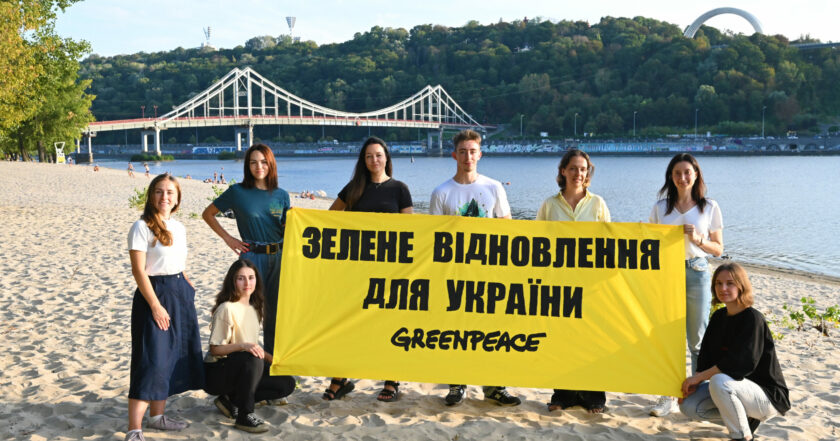Eco-solutions: Greenpeace arrives in Ukraine to tackle green reconstruction and nuclear risks

Photo: Facebook / Greenpeace: Green reconstruction of Ukraine
Greenpeace of Central and Eastern Europe (CEE) officially opens a new office in Kyiv today, September 10. The Global Environmental Protection Network has been working in Ukraine since the beginning of the full-scale invasion in 2022, implementing the "Green Restoration of Ukraine" project. Greenpeace is now officially expanding its office to step up work on the country's green recovery and investigation into environmental war crimes caused by the Russian invasion. The team will also continue to monitor nuclear security risks around Ukrainian nuclear power plants.
Greenpeace Ukraine reports this.
Environmentalist Nataliia Hozak heads the Greenpeace office in Ukraine.
"The people of Ukraine deserve a strong and energetic presence of Greenpeace to support activism and democratic values in war conditions," Nataliia Hozak said. "Ukraine must advocate for fossil fuel abandonment to ensure its security. Our goal is to assist Ukraine in sustainably reconstructing its social infrastructure, utilizing clean energy from solar panels and wind turbines. These solutions are not simply "green" but the path towards Ukraine's sustainable and self-sufficient future."
With the beginning of the full-scale invasion, Greenpeace offices in Central and Eastern Europe (Slovakia, Poland, Hungary, Romania, Bulgaria) joined the humanitarian work, supporting colleagues in the environmental field and Ukrainian refugees.
Working with local environmental organizations, Greenpeace has already:
- documented the ecological destruction caused by the war,
- condemned the destruction by the Russians of the Kakhovska HPP,
- investigated the crises at the Chornobyl and Zaporizhzhia nuclear power plants,
- implemented the first pilot projects of green reconstruction (for example, restoration of the dispensary in Horenka, Kyiv region, assistance with installing solar panels in schools and kindergartens in Hostomel, etc.).
Alexander Egit, Executive Director of Greenpeace CEE, of which the new Ukrainian office is a part, notes:
"Over the next few years, we expect the European Union and other countries to invest billions of euros in the reconstruction of Ukraine. We want to make sure that Ukraine will be rebuilt in a more environmentally friendly and sustainable way. Greenpace's strict financial independence from state or corporate funding is a key prerequisite for this work. Our goal is to support reconstruction with the help of decentralized renewable energy for an independent, modern, and green Ukraine – now and after the war."
The Russian invasion of Ukraine has significantly impacted energy, food, finance, biodiversity, trade, nuclear security, climate, and geopolitics. As a result, Greenpeace organizations globally have shifted their campaigns to take a more radical approach to addressing these issues.
The Ukrainian office of Greenpeace is strategically linked to the international Greenpeace network. Eliminating reliance on fossil fuels, preserving the environment, and highlighting the risks of nuclear energy are key focus areas for Greenpeace's efforts globally.
Mads Christensen, Executive Director of Greenpeace International:
"I am deeply moved, full of hope, and incredibly proud of the Greenpeace Ukraine team and everyone involved in creating this new office under such difficult circumstances. Our efforts in Ukraine are already lighting the way forward, demonstrating how renewable energy can help power schools and hospitals even despite the horrors of war.
But this is only the beginning. When green recovery is scaled up, it can reveal the steadfast resilience of entire nations. With the new office in Kyiv, Greenpeace will work with the courageous and dedicated Ukrainian people to build a green and safe Ukraine. Together, we don't just imagine a better future – we create it."
For reference:
It's worth mentioning that hybrid solar power systems were set up at the Hostomel school and Mykolaiv dispensary. In light of recent Russian assaults on Ukraine's energy infrastructure, these facilities will enable Ukrainians to continue their education and access healthcare services even in the event of power outages without the need for generators.

Experts trace river pollution in Ukraine to Russian factory leaks: What's happening and how it affects local communities

Ukraine's solar and wind energy capacity surpasses electricity demand by nearly 150 times – Greenpeace survey




















































